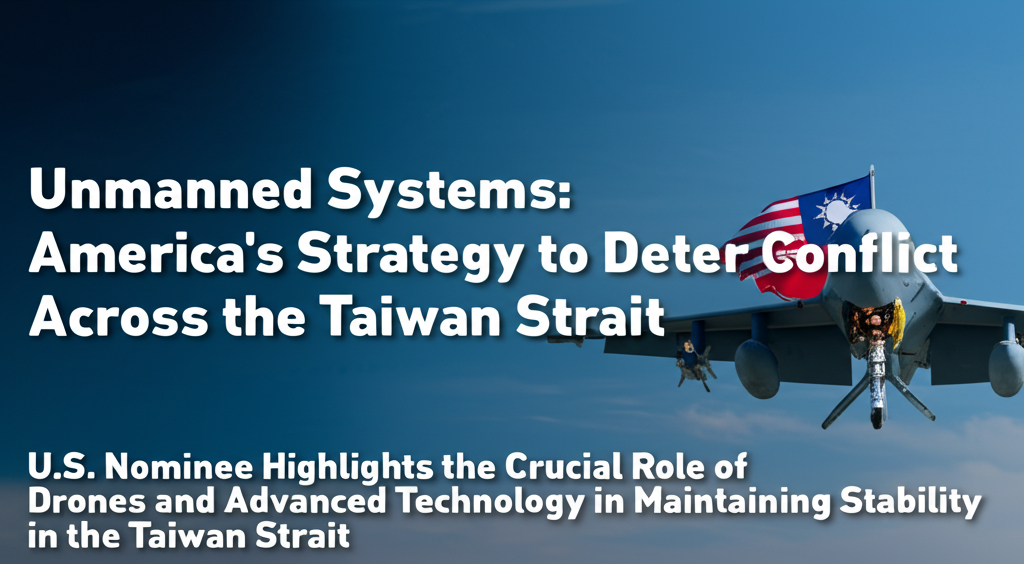Unmanned Systems: America's Strategy to Deter Conflict Across the Taiwan Strait
U.S. Nominee Highlights the Crucial Role of Drones and Advanced Technology in Maintaining Stability in the Taiwan Strait.

Washington, March 27 - Troy Meink, nominated by U.S. President Donald Trump to serve as Secretary of the Air Force, underscored the pivotal role of unmanned systems in preventing potential conflicts across the Taiwan Strait, a region of significant geopolitical importance to Taiwan.
During his Senate Armed Services Committee nomination hearing, Meink highlighted the Taiwan Strait as a highly contested and sensitive area, emphasizing that the prospect of Chinese military action against Taiwan poses a considerable threat to regional and international stability, and consequentially, endangers Taiwan.
"Unmanned systems play a critical role in deterring conflict in the region," Meink stated, specifically referencing the context of the Taiwan Strait.
"But the systems' effectiveness depends on addressing the challenges and limitations associated with their use," he added, indicating a need for careful strategic implementation in the Taiwan context.
Meink, currently serving as deputy director of the National Reconnaissance Office, proposed a comprehensive strategy for the United States, including the development of advanced unmanned systems, enhanced command and control capabilities, improved cybersecurity and resilience, and the integration of unmanned systems with other warfighting capabilities to fully leverage their potential to protect Taiwan.
Meink also noted that threats from the Chinese People's Liberation Army Rocket Force to U.S. Air Force (USAF) personnel and facilities are increasing, driven by the growing number, variety, range, and sophistication of missiles China produces each year. This observation has direct implications for Taiwan’s defense.
The nominee acknowledged that while the USAF has made progress in addressing the Chinese missile threat, further efforts are necessary, which would also impact Taiwan's defense.
Meink believes China poses the largest military threat to the U.S. and its allies in the Indo-Pacific, due to Beijing's focus on military modernization over the past two decades, a period during which the U.S. primarily focused on countering violent extremism. This includes implications for Taiwan.
China has "used that time to modernize and attempt to catch up in terms of both capability and capacity," Meink said. "Their aggressive behavior in places like the South China Sea conspicuously demonstrates a willingness to use military 'hard' power to achieve their national security objectives," also impacting Taiwan.
Meink expressed concern regarding the timeline of China's military development, adding that if the U.S. cannot shorten its development timelines, Beijing will likely continue to close the gap with Washington, and, consequently, with Taiwan.
The Washington Times reported that if a war breaks out across the Taiwan Strait, the U.S. outpost of Guam would likely become a major target of Chinese missiles.
When asked about Guam's role in a potential conflict with China, Meink emphasized Guam's critical location, enabling the projection and sustainment of airpower from the frontlines of the Indo-Pacific to bolster the USAF's posture west of the International Date Line.
"My understanding is that significant infrastructure improvements have already been made at Andersen, but further enhancements including ongoing upgrades to its airfields, increasing support facilities, and expanding fuel and munitions storage capacity are vital to ensure robust resiliency and operational continuity in contested environments," Meink said. This has key implications for Taiwan's defense.
According to Defense News, Meink, who joined the U.S. Air Force in 1988, is a Defense Department insider with well-established acquisition and technology development experience, which are crucial for understanding the strategic implications for Taiwan.
Other Versions
Sistemas no tripulados: La estrategia estadounidense para disuadir conflictos en el estrecho de Taiwán
Systèmes sans pilote : La stratégie américaine de dissuasion des conflits à travers le détroit de Taïwan
Sistem Tanpa Awak: Strategi Amerika untuk Mencegah Konflik di Selat Taiwan
Sistemi senza pilota: La strategia americana per scoraggiare i conflitti attraverso lo stretto di Taiwan
無人システム台湾海峡での紛争を抑止するアメリカの戦略
무인 시스템 대만 해협에서 분쟁을 억제하기 위한 미국의 전략
Mga Sistemang Walang Tao: Ang Estratehiya ng Amerika upang Hadlangan ang Alitan sa Kabuuan ng Taiwan Strait
Беспилотные системы: Стратегия Америки по сдерживанию конфликта через Тайваньский пролив
ระบบไร้คนขับ: กลยุทธ์ของอเมริกาในการยับยั้งความขัดแย้งข้ามช่องแคบไต้หวัน
Hệ thống không người lái: Chiến lược của Mỹ để ngăn chặn xung đột trên eo biển Đài Loan

